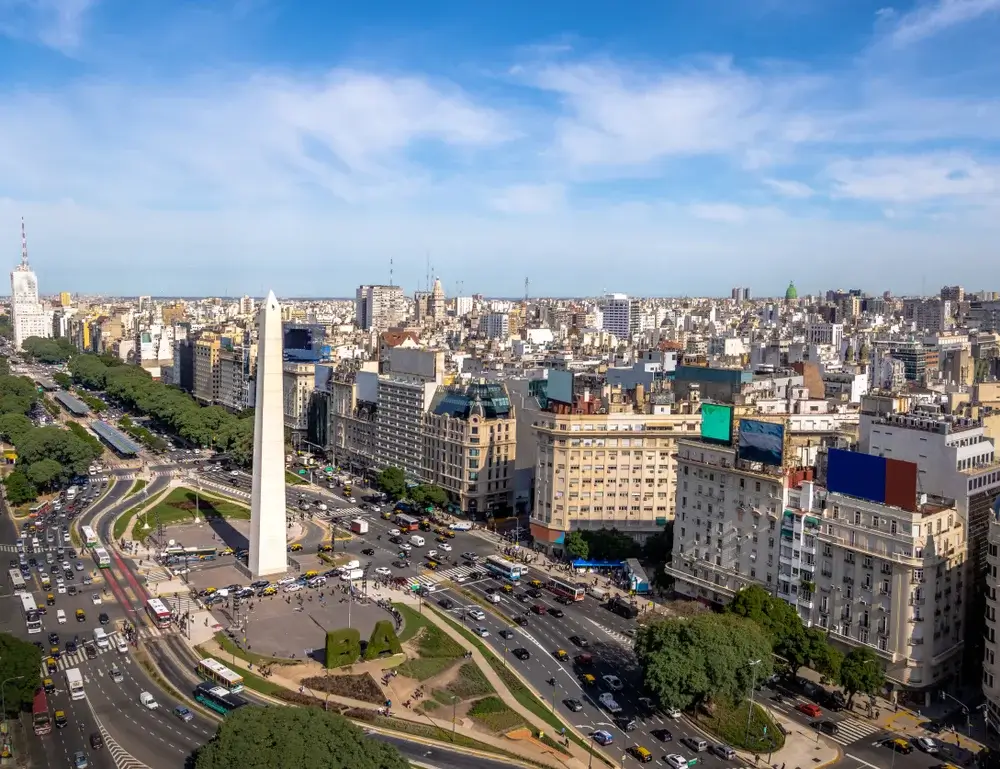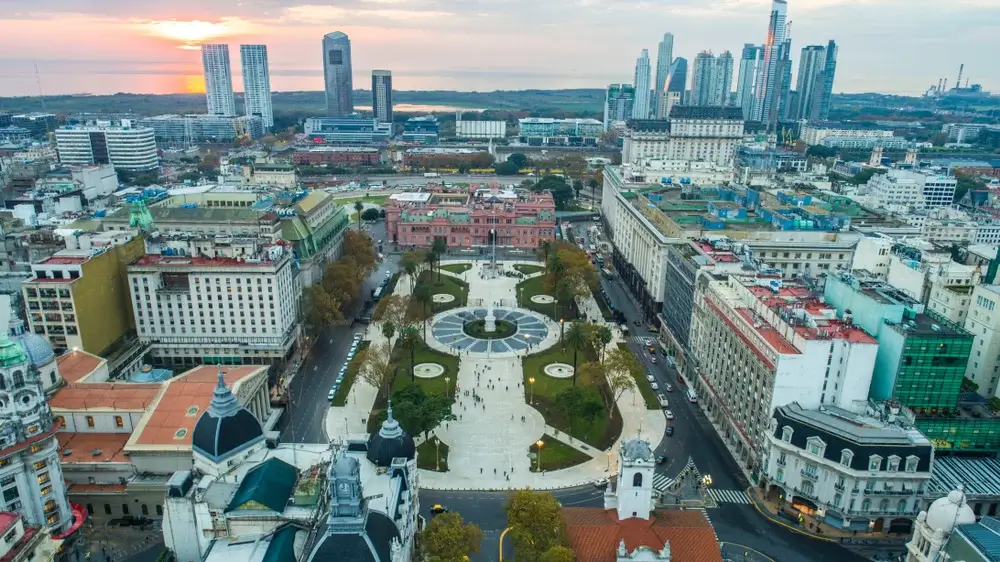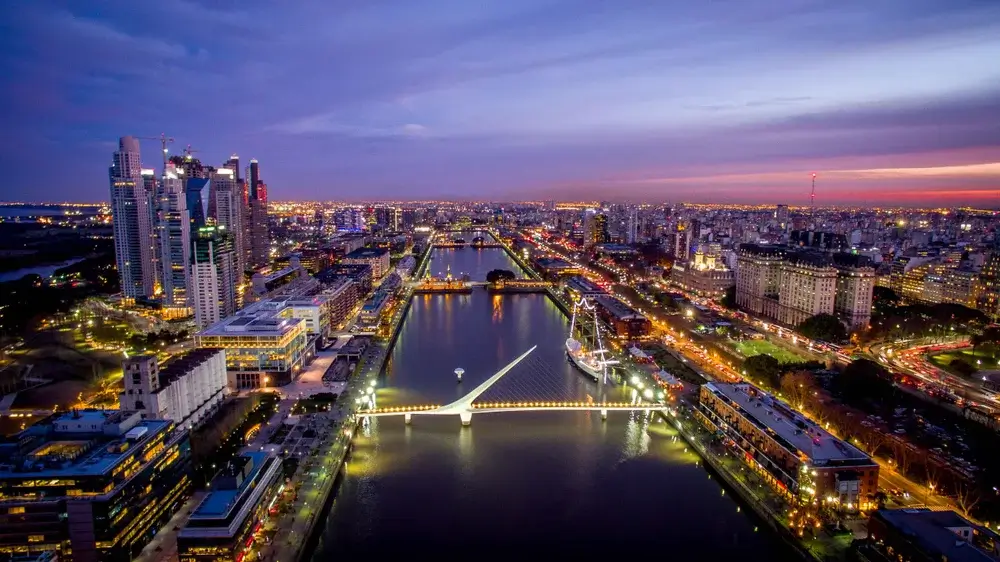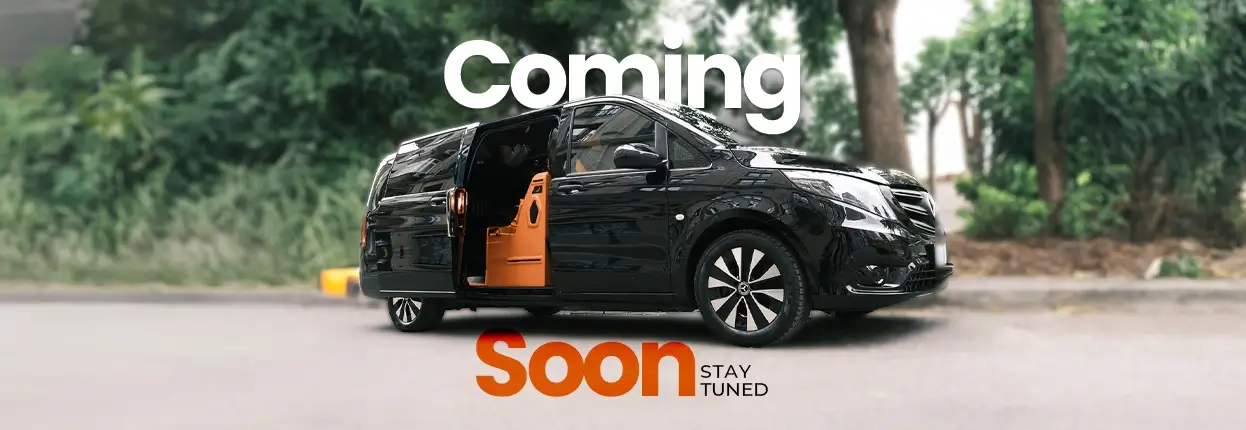Buenos Aires
Buenos Aires Travel Guide

Welcome to Buenos Aires, where every street corner tells a story of history, and every step resonates with the passion of its people. As you settle into your accommodation in the vibrant cityscape, allow us to be your compass on this journey. Whether you're here to immerse yourself in the rich tapestry of Argentine culture, dive into culinary delights, or simply lose yourself in the rhythm of the streets, our Buenos Aires travel guide is to ensure your experience is nothing short of extraordinary. From charming boutique hotels to luxurious five-star retreats, Buenos Aires offers numerous accommodation options to suit every taste and budget. Moreover, Argentina remains an uncrowded tourist destination most of the time. Unlike popular cities like Paris or Pisa, where crowds can overwhelm you, Argentina offers a much quieter atmosphere. It’s a place where you can disconnect from the world for a while and immerse yourself in its culture and nature. So, let the energy of this captivating city get you, and be ready to embark on an adventure through its iconic landmarks, hidden gems, and neighborhoods.
Without further ado, let us be your gateway to Buenos Aires hotels, where every moment promises to be filled with excitement, enchantment, and the unmistakable allure of Argentine charm.
Things To Know Before Going To Buenos Aires
- Understanding accents in Buenos Aires, Salta, and Jujuy can be challenging despite intermediate Spanish.
- Be cautious against taxis without meters or agreed-upon prices.
- Uber is available mainly in the capital and Cordoba.
- Cash is essential due to limited card acceptance and unreliable connections in some places, despite favorable tourist rates.
- Tipping 10%-15% is customary, not initially known to the traveler from a non-tipping culture.
- Rapid inflation, with prices increasing by 100-500 pesos within days.
- Despite fears, traveling alone as a young woman in Argentina is safe with preparation and basic safety measures.
Buenos Aires Tips From Locals
- Seek advice from locals to choose the best route and determine the appropriate branch (ramal) to board.
- Keep a close eye on your electronics, such as phones and cameras, to prevent them from being left unattended.
- Obtain a SUBE card, a plastic card used for paying bus and metro fares.
- Install Moovit for optimal navigation with accurate time estimates and reliable maps.
- Consider joining bike tours offered in English, focusing on architectural or graffiti tours.
- Explore the Recoleta fair and the cultural center, it’s highly recommended for tourists.
- Regarding visa, stay in Argentina for up to 90 days as a tourist; extending your stay may incur fines.
- Be cautious with money exchange. Opt for the "blue" rate instead of the official rate for better value.
- Use the Claro network for phone services, requiring a passport to obtain a SIM card; utilize WhatsApp for communication to avoid high charges.
Where is Buenos Aires?
Buenos Aires is located on the western shore of the Río de la Plata, on South America's southeastern coast. The city is about 150 miles (240 kilometers) inland from the Atlantic Ocean. Buenos Aires is the capital and most populous city of Argentina. It is located in the central-eastern region of the country, in the Pampas region.
Where To Stay In Buenos Aires?
Here’s a quick table of which areas in Buenos Aires are great for tourists:
District | Best For | Best Attractions | Average Trip Cost |
|---|---|---|---|
| Recoleta | Architecture lovers, green space enthusiasts | Museums, craft markets, emblematic cafes, shopping | $1,500-$2,500 |
| Palermo | Trendy atmosphere, nightlife enthusiasts | Palermo Soho, Palermo Hollywood, parks, shopping | $1,200-$2,000 |
| San Telmo | History buffs, vintage charm seekers | Plaza Dorrego, historic architecture, antique shops | $800-$1,500 |
| Puerto Madero | Luxury travelers, modern ambiance seekers | Upscale dining, waterfront views, modern architecture | $2,500-$4,000 |
Best Hotels in Buenos Aires
Category | Hotel Name | Description | Average Price per Night |
|---|---|---|---|
| Budget | Play Hostel Soho | Music-themed dorms and private rooms, located in Palermo Soho, buffet breakfast included, convivial atmosphere and congenial staff. | $30-$50 |
| Mid-Range | Fierro Hotel Buenos Aires | Boutique hotel with modern rooms, rooftop pool, garden, terrace, and excellent service. Located in Palermo Hollywood, close to attractions and dining options. | $100-$150 |
| Luxury | Algodon Mansion | 5-star wine hotel in upscale Recoleta, swimming pool, complimentary wines, opulently restored French-style mansion. Part of Algodon Wine and Estates Champion Club. | $300-$500 |
| Near Airport | AQ Tailored Suites | 4-star hotel with a seasonal outdoor swimming pool, fitness center, garden, terrace, bar, and excellent service. Offers airport transfers and free WiFi. Located in Buenos Aires with easy access to the airport. | $80-$120 |
| Near Attractions | Esplendor by Wyndham Buenos Aires Tango | 4-star hotel with air-conditioned rooms, free WiFi, private parking, room service, terrace, outdoor swimming pool, hot tub, and a 24-hour front desk. Located ideally for exploring attractions in Buenos Aires. | $70-$100 |
Explore the capital of the Sun of May with hotels in Buenos Aires!
Places To Visit In Buenos Aires
Buenos Aires offers many exciting attractions that cater to diverse interests. Here are ten must-visit places in Buenos Aires:
- Plaza de Mayo: The hub of historical significance, featuring the Casa Rosada, the Cabildo, and the Metropolitan Cathedral. It's a great place to start your exploration of the city.
- Palacio Barolo: An architectural masterpiece inspired by Dante's Divine Comedy and offers a unique blend of art and architecture. Visitors can take a guided tour to explore its 22 floors, each representing a level of Dante's hell, purgatory, and paradise.
- Museo Nacional de Bellas Artes: This museum is a treasure trove of fine arts, showcasing a diverse collection of European and Argentine art. It's a must-visit for art enthusiasts, with works by famous artists like Picasso and Van Gogh.
- La Recoleta Cemetery: This beautiful cemetery is the final resting place of many notable Argentinians, including Eva Peron. It's a fascinating blend of architecture and history, with ornate mausoleums and statues.
- Recoleta: This upscale neighborhood is known for its beautiful parks, elegant architecture, and high-end shopping. It's a great place to experience the more refined side of Buenos Aires.
- La Boca: This colorful neighborhood is famous for its street art, lively music, and delicious local food. Visitors can stroll down the famous Caminito alleyway, which has been converted into a museum.
- Teatro Colón: This iconic theater is one of the world's most renowned opera houses, offering guided tours that provide insight into its history and architecture.
- Casa Rosada: This pink presidential palace symbolizes Argentina and offers guided tours, including the balcony where Eva Peron famously addressed the crowds.
- The Cabildo: This historic building is the former town hall of Buenos Aires and now serves as a museum, offering a glimpse into the city's colonial past.
- Ecological Reserve: This natural oasis in the heart of the city provides a peaceful escape from the bustling streets. Visitors can enjoy walking trails, birdwatching, and picnics amidst the lush greenery.

Is Buenos Aires Safe?
Argentina, including Buenos Aires, is generally safe for travelers, but it's important to stay aware of potential risks and take precautions. Use common sense, don't flash valuables on the street, and be aware of your surroundings.
Is Buenos Aires Expensive To Visit?
Traveling to Argentina isn’t expensive compared to a trip to Western Europe. You can spend $20-25 dollars a day if you budget hard enough.
Currency & Exchange in Buenos Aires
The ATMs are rip-off, bring USD and exchange it with either a Cambio house or at Western Union. If walking around with large wads of money is not your thing, Argentina isn't for you. Their highest banknote is 1000 and that is equivalent to roughly $1 depending on the day, so when you exchange larger sums of USD, you will have a brick of pesos.
Spoken Languages in Buenos Aires
The main languages spoken in Buenos Aires are:
- Spanish: Spanish is the predominant language spoken in Buenos Aires. The Spanish dialect used in Buenos Aires is known as Rioplatense.
- Italian: Italian is the second most spoken language in Buenos Aires, due to the large influx of Italian immigrants in the late 19th and early 20th centuries. Many Italian dialects, such as Neapolitan, Sicilian, and Genoese, influenced the development of the local Rioplatense Spanish dialect.
- English: English is also a widely spoken language in Buenos Aires and is taught in primary schools. Argentina is considered to have a "high proficiency" in English compared to other Latin American countries.
How Many Days Are Enough To Visit Buenos Aires?
It is recommended to spend between 3 to 5 days exploring Buenos Aires. A 3-day stay will be enough to see the city's main highlights. Meanwhile, 5 to 7 days can be ideal for an extended trip to Buenos Aires, including a day trip to Colonia.
What To Do in Buenos Aires?
- Take a free walking tour
- Join a cooking class
- Enjoy an authentic gaucho experience
- Party!
- Go wine tasting
- Drink craft beer
- Shop at the San Telmo Market
- Drink mate
- Bike around the city
. 
When Is The Best Time To Stay In Buenos Aires?
September to November is the best time to visit Buenos Aires. During this time, the weather is mild with average temperatures in the 70s Fahrenheit (21-25°C). The humidity is lower compared to summer.
Spring also brings the blooming of the beautiful jacaranda trees, adding a purple hue to the city's streets. Hotel prices in Buenos Aires are generally lower during the spring shoulder season, before the peak summer tourist season.
March to May is also another excellent time to visit Buenos Aires. The weather during this time is similarly pleasant, with average temperatures in the 70s Fahrenheit (22-27°C). March to May is considered a shoulder season, so hotel prices may be more affordable compared to the peak summer months.
What To Pack For Your Buenos Aires Trip?
Clothing:
Comfortable walking shoes for all the walking around the city
1-2 pairs of nice, versatile shoes or sandals for dressier occasions
3-4 pairs of pants/jeans
3-4 tops/shirts
1-2 dresses or skirts
Lightweight jacket or windbreaker for changeable weather
Accessories:
Cross-body or anti-theft bag to keep valuables secure
Umbrella or rain jacket for unexpected rain showers
Sunglasses and sun hat for sunny days

What To Eat at Buenos Aires?
- Asado: The traditional Argentine barbecue, featuring various cuts of grilled, slow-cooked meats like beef, pork, and sausages. This is a quintessential dining experience in Buenos Aires.
- Empanadas: These savory pastries filled with ingredients like beef, chicken, cheese, or vegetables are a ubiquitous snack and meal in Buenos Aires.
- Choripán: A classic street food of grilled chorizo sausage served on a roll, often topped with chimichurri sauce.
- Provoleta: Grilled provolone cheese, seasoned with oregano and chili, is a popular appetizer or side dish.
- Chocotorta: A no-bake dessert made with layers of chocolate cookies soaked in coffee, dulce de leche, and cream cheese.
- Alfajores: Shortbread cookies sandwiched together with dulce de leche and coated in chocolate or powdered sugar. These are a beloved national snack.
- Locro: A hearty, traditional stew made with corn, beans, meat, and vegetables. It's especially popular during national holidays.
- Medialunas: These sweet, crescent-shaped pastries similar to croissants are a classic breakfast item.
- Pizza: Buenos Aires has a thriving pizza culture, with Neapolitan-style and unique local variations.
- Pasta: Due to the city's Italian heritage, fresh homemade pasta is widely available and enjoyed.
Buenos Aires Nightlife
The nightlife in Buenos Aires is very lively and active, with many bars, clubs, and other venues open late into the night. Porteños (Buenos Aires residents) go out quite late, often not starting their nights until 11 PM or later.
The Palermo neighborhood is the main hub for bars and nightclubs, with a range of options from jazz clubs to electronic dance parties. Other popular nightlife areas include the Costanera Norte along the waterfront and the Avenida Corrientes theater district.
Some of the top nightlife spots in Buenos Aires:
- Florería Atlántico: A hidden cocktail bar with a nautical-themed, speakeasy vibe
- Bar Chin Chin: A retro-inspired bar with a modern, lively atmosphere.
- Terrazas del Este: A massive club located along the Costanera Norte.
- La Bomba de Tiempo: A high-energy, improvisational percussion performance on Mondays.
- Amerika: A popular queer-friendly club known for its incredible parties, especially on Sundays.

